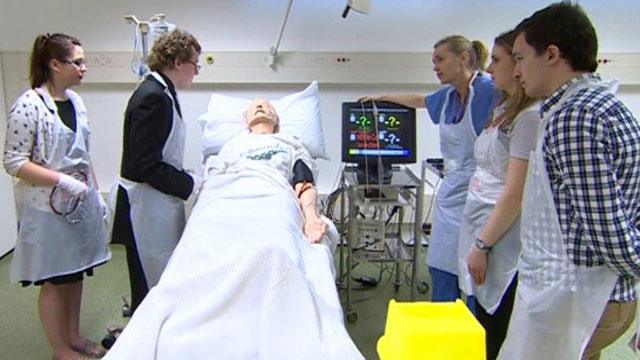12 die from heart attacks each week, BHF Cymru says
- Published
Ruth Coombs of the British Heart Foundation says more research is needed
Twelve people under the age of 65 die from heart attacks each week in Wales, figures from British Heart Foundation Cymru have revealed.
They also show Welsh hospitals dealt with almost 9,600 heart attack cases in 2013/14, up from 8,000 the year before.
The charity said medical research, much of which it has funded, has helped to significantly improve survival rates.
But it says further research is urgently needed to save more lives with coronary heart disease the main cause.
About 135,000 people in Wales are living with coronary heart disease.
BHF said, despite improvements in treatment and diagnosis, about a third of heart attacks are fatal.
"Through medical research, we've made great progress in saving the lives of people suffering from heart attacks," said BHF medical director Prof Peter Weissberg.


Vaughan Gething said the report highlighted 'some of the excellent work taking place in hospitals across Wales'
Survival rates improving in Wales
Heart disease survival rates are improving thanks to improved detection and the ban on smoking in public places, according to a new report
Deputy Health Minister Vaughan Gething launched the second All Wales annual report on heart disease on Tuesday
He said the Welsh government has invested more than £2m in equipping Welsh ambulances with state-of-the-art defibrillator monitors
Key findings
Improved detection, the ban on smoking in public places and public health efforts have reduced the number of people dying prematurely from coronary heart disease
In Wales, 400 fewer people died in 2012 than in 2010
Almost 97% of adults aged between 35 and 74 survive following a hospital admission for a heart attack
The number of patients with high blood pressure, which can increase the risk of developing cardiovascular conditions, continues to rise

"But we mustn't be lulled into thinking we've beaten the disease.
"Every year thousands of people are still dying from heart attacks and coronary heart disease remains the UK's single biggest killer.
"We urgently need to fund more research to find new ways to prevent and treat heart attacks, and ultimately, save more lives."
Prof Weissberg said that, despite knowing that risk factors such as smoking increase the risk of heart attack, we still have "no way" to stop the furring of the arteries in coronary heart disease that causes many.
"This is a challenge that only research can provide the answer to," he added.
- Published28 May 2015

- Published15 April 2015

- Published25 January 2013

- Published9 August 2012
